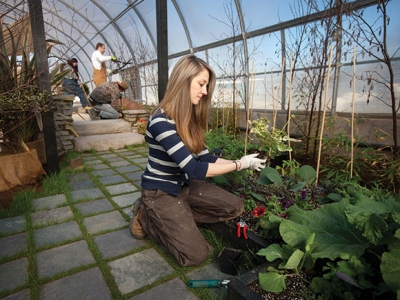
Stumbling upon a calm oasis of green in the middle of a bustling metropolis can be oddly comforting. Maybe that’s why even sprawling cities such as New York and London cherish their green spaces. With toxic air pollution choking these green lungs, there is a pressing need for horticulturists and conservationists. Professionals specialising in growing plants (both edible and ornamental) are known as horticulturists. Depending on your interest, you can work in landscaping and design, maintenance, research and conservation, and irrigation. If you can imagine a work-day surrounded with the beauty and charm of greenery, the field of horticulture has a plethora of opportunities.
How it works?
From developing manicured lawns and designing water systems to growing hybrid and exotic varieties of flowers, there’s a lot to horticulture than just gardening. Here’s a list of some of the branches in this field:
Garden design is part of horticulture. Garden designers and conservationists aesthetically improve green spaces by landscaping. They also develop and maintain heritage gardens, grounds and other green spaces.
Arborist care for and manage trees by overseeing planting, pruning and tree removal. Like arborists there are also specialisations in growing fruits and flowers. For instance, florists are experts in flowers – they are the ones who grow beautiful and exotic varieties of flowers and experiment with hybrids.
Forestry technicians help manage, develop and conserve woodlands. They improve the quality of natural areas and forests.
Irrigation engineers create and develop watering systems for different landscapes, areas and projects. These projects can range from agriculture and crop irrigation to dams, drainage systems and canals, as well as commercial and residential projects.
Conservation and research involves coming up with new ways of cultivating plants using greenhouses and other methods, and developing their resistance to pests and protecting plants.
Required skills
- A passion for plants and the environment
- Creativity and attention to detail
- Problem solving and critical thinking skills
- Communication skills
- Research orientation
Scope
Horticulture professionals works access a gamut of organisations, from government agencies to research department at universities. Some jobs emphasise the technological aspects of research and science, while others are more hands-on in nature. Those interested in garden design can work with landscape construction companies or a curators and consultants in botanical gardens. Those keen on maintenance and development can work as plantation managers overseeing the operations of a plantation. Aspirants inclined towards research can find opportunities in government agencies, horticulture societies and universities.
What to study
Educational requirements for a career in horticulture typically include a Bachelor or Master of Science (B.Sc or M.Sc) in Horticulture. An engineering background – Bachelor of Technology (B.Tech.) or Bachelor of Engineering (B.E.) in Civil Engineering – is needed if you want to work as an irrigation engineer.
Where
- Annamalai University, Tamil Nadu: B.Sc in Horticulture
- University of Calcutta: M.Sc Agriculture (Horticulture)
- INDIAN Institute of Technology Bombay, Delhi, Kharagpur, Kanpur, Roorkee and Madras offer B.E. and B.Tech in Civil Engineering
- Institute of Horticulture Technology, Delhi: Certificate courses in Production Technology of Cut Flowers and Open Glasshouse Supervison, Fruit Production, Year Round Vegetable Production
Abroad:
- Cornwall College, University of Plymouth: B.Sc (Hons) Horticulture (Garden and Landscape Design) and B.Sc (Hons) Horticulture (Plant Science)
- SRUC Scotland’s Rural College, Edinburg: B.Sc (Hons) in Garden and Greenspace Design and B.Sc (Hons) Horticulture
- The Royal Horticultural Society, the U.K.: Level 1, 2 and 3 qualifications in Plant Growth, Propagation and Development; Garden Planning, Establishment and Maintenance; and Practical Horticulture
- Royal Botanic Gardens, Kew, the U.K.: Diploma in Horticulture – three years.
Picture Credit : Google
